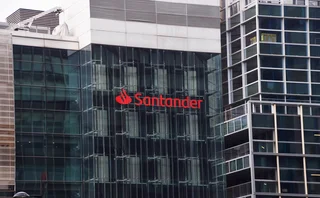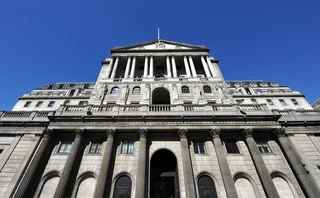
Monthly op risk losses: Aussie banks settle rate rigging claims
Breakdown of top five loss events, plus insight on US consumer protection fines. Data by ORX News

The largest loss in October was incurred by Intesa Sanpaolo, which announced it had allocated €100 million to compensate former customers of Banca Popolare di Vicenza and Veneto Banca who allegedly fraudulently lost their savings with the now-defunct Italian banks. Intesa announced it would take over the two banks in June 2017. After reviewing their accounts, Intesa chief executive Carlo Messina said he found the two banks had failed in their fiduciary duties towards their customers.
Both banks are under investigation for allegedly advising retail customers to invest their savings in the banks’ own shares. The customers subsequently lost their savings when the banks were rescued by the Italian state in June 2017.
In second place, Deutsche Bank was ordered to pay €48 million to Postbank investors after it delayed proposing a takeover offer when it began acquiring Postbank in 2008.
The bank paid €57.25 per share for its first share purchase, for a percentage of Postbank just under the threshold at which it would be required to make a formal takeover offer. After buying more shares which took it over this threshold, the bank’s subsequent 2010 takeover offer was for €25 per share. However, shareholders argued that Deutsche Bank had been in de facto control of the bank from the time of its initial share purchase and so should have made an offer at €57.25 per share.
Deutsche Bank denied the allegations, but a Cologne regional court ruled that some shareholders were entitled to additional payments of up to €32.25 per share, to bring the total to €57.25 per share.
Bank of America Merrill Lynch was fined £34.5 million ($45.4 million) by the UK Financial Conduct Authority for failing to report 68.5 million exchange-traded derivative transactions in the third biggest loss. The FCA identified a number of issues with its subsidiary Merrill Lynch International’s reporting system, set up to comply with the European Market Infrastructure Regulation, that led to the failures.
The fine also took into account two previous reporting failures by Merrill Lynch International, in August 2006 and in April 2015. The most recent of those settlements was, at the time, the UK’s largest transaction reporting-related fine, at £13.3 million.
In fourth place, RBS agreed to pay $44.1 million to the US Department of Justice to settle allegations it made fraudulent misrepresentations in the purchase, sale and broking of collateralised loan obligations and residential mortgage-backed securities to its customers between 2008 and 2013 to increase its profits on these products.
Finally, Australian banks ANZ and NAB reached settlements of A$50 million with the country’s securities regulator over misconduct in transactions involving the local benchmark rate, BBSW, during 2010–2012 (see box below).
Correction, January 2, 2018: ORX News has reclassified the original largest loss for October – Bank Austria’s €790 million payment for transferring staff to the country’s state pension scheme – as a non-operational risk loss. The top five losses for October and accompanying charts have been updated. The loss has also been removed from the ORX News database.
Spotlight: Rate-rigging settlements down under
National Australia Bank has agreed a settlement of A$50 million ($38 million) with the Australian Securities and Investments Commission over allegations it manipulated the country’s wholesale interbank rate, the bank bill swap rate, along with two other banks, ANZ and Westpac.
The NAB settlement comprises a A$10 million penalty, Asic’s legal costs of A$20 million, and a A$20 million payment to a consumer protection fund.
Asic filed civil penalty proceedings against the three banks in 2016, claiming they manipulated the rate between 2010 and 2012. In addition to NAB, ANZ also agreed to settle for the same amount, whereas Westpac is taking the allegations to trial, local media reports. The three banks, as well as Commonwealth Bank of Australia, are four of the 17 global banks accused in a class action lawsuit brought by two US funds of manipulating the bank bill swap rate.
The case echoes those ongoing from investigations into the alleged manipulation of Libor and other related benchmarks by major banks worldwide. Authorities and investors in territories such as the US, UK, EU and Switzerland have reached over $11 billion of settlements with banks for the alleged actions of their traders, which involved colluding to move the benchmarks in a direction more favourable to their trading positions.
Although most of the manipulation is said to have occurred before 2012, losses are continuing. For example, JP Morgan agreed to pay $71 million in July 2017 to settle claims by US investors that it rigged the yen Libor rate between 2006 and 2011.
In focus: CFPB fines cost financial institutions almost $7bn
The Consumer Financial Protection Bureau continues to be an active regulator in the US retail financial markets – though it faces setbacks and legal challenges to its authority. Responsible for protecting US consumers “from unfair, deceptive, or abusive practices”, the CFPB can impose unlimited relief, and civil monetary penalties of up to $1 million per day for violations.
Since its inception in 2011, the CFPB has brought enforcement actions against financial institutions totalling $6.8 billion, at an average of one settlement per month. Of this total, 92% is in restitution, compensation and relief payments; for example, debt relief to consumers making payments on financial products that firms mis-sold. This is in keeping with the regulator’s primary mandate to protect consumers. The remaining 8% is in civil money penalties.
Nearly three-quarters of the relief orders were in conjunction with other regulators and authorities, particularly the Office of the Comptroller of the Currency, and the Federal Deposit Insurance Corporation, as well state authorities and the US Department of Justice.
The largest single action, at $2.1 billion, is a relief order imposed on Ocwen in 2013 for misconduct during its mortgage servicing process. This settlement, reached with the CFPB, 49 US states and the District of Columbia, required Ocwen to make principal loan reductions of $2 billion and refund $125 million to customers.
Since its peak in 2013, the annual amount of relief has fallen, with the emphasis in recent years shifting towards monetary penalties. Notable fines include $100m imposed on Wells Fargo in 2016 for opening unauthorised accounts, which made up two-thirds of the $150m of penalties imposed by the CFPB that year.
Retail credit products were at the centre of 97% of CFPB’s fines and settlements. Mortgages topped the list at $3.0 billion, driven by the Ocwen settlement, but credit cards followed close behind at a total of $2.8 billion over 18 separate events. The majority of these fell in 2014 and 2015, including two settlements of around $770 million, one with Bank of America over allegations of unfair billing practices, and one with Citigroup for allegedly using deceptive marketing for credit card add-on products.
Although the CFPB is continuing to issue fines and reach settlements, a number of initiatives by the bureau’s Obama-appointed director, Richard Cordray, have faced criticism. A rule issued by the bureau in July to bar companies from using arbitration clauses in contracts to avoid class-action lawsuits was repealed in the Senate in October.
An ongoing lawsuit between the CFPB and mortgage service provider PHH has called into question the very existence of the agency. PHH filed the suit after Cordray increased a $6 million fine over mortgage kickbacks by $103 million, claiming the director did not have the authority to do so. In October 2016, the Court of Appeals ruled that the CFPB’s governance structure was unconstitutional, and in March this year the Department of Justice argued that the US president should be able to dismiss the director. PHH went further, arguing the CFPB should be abolished. As things stand, Cordray cannot be removed before the end of his term next July.
So far in 2017, there have been 11 enforcement actions brought by the CFPB for a total of $272.8 million. Again, the majority of these losses are related to retail credit products, although $211.1 million of these losses are due to actions involving student loans.
The largest order by the CFPB so far this year, a $192 million settlement for Aequitas, which allegedly facilitated a predatory student loan scheme, falls into this category. A smaller but still notable $4.6 million fine was imposed on JP Morgan, after the regulator found it failed to provide accurate reports on current accounts to credit agencies.
All information included in this report and held in ORX News comes from public sources only. It does not include any information from other services run by ORX and we have not confirmed any of the information shown with any member of ORX.
While ORX endeavours to provide accurate, complete and up-to-date information, ORX makes no representation as to the accuracy, reliability or completeness of this information.
Only users who have a paid subscription or are part of a corporate subscription are able to print or copy content.
To access these options, along with all other subscription benefits, please contact info@risk.net or view our subscription options here: http://subscriptions.risk.net/subscribe
You are currently unable to print this content. Please contact info@risk.net to find out more.
You are currently unable to copy this content. Please contact info@risk.net to find out more.
Copyright Infopro Digital Limited. All rights reserved.
As outlined in our terms and conditions, https://www.infopro-digital.com/terms-and-conditions/subscriptions/ (point 2.4), printing is limited to a single copy.
If you would like to purchase additional rights please email info@risk.net
Copyright Infopro Digital Limited. All rights reserved.
You may share this content using our article tools. As outlined in our terms and conditions, https://www.infopro-digital.com/terms-and-conditions/subscriptions/ (clause 2.4), an Authorised User may only make one copy of the materials for their own personal use. You must also comply with the restrictions in clause 2.5.
If you would like to purchase additional rights please email info@risk.net
More on Comment
How a serverless risk engine transformed a digital bank
Migrating to the cloud permitted scalability, faster model updates and a better team structure
Op risk data: Mastercard schooled in £200m class action
Also: Mitsubishi copper crunch, TD tops 2024 op risk loss table. Data by ORX News
Transforming stress-testing with AI
Firms can update their stress-testing capability by harnessing automated scenario generation, says fintech advocate
Op risk data: Santander in car crash of motor-finance fail
Also: Macquarie fined for fake metals trade flaws, Metro makes AML misses, and Invesco red-faced over greenwashing. Data by ORX News
‘It’s not EU’: Do government bond spreads spell eurozone break-up?
Divergence between EGB yields is in the EU’s make-up; only a shared risk architecture can reunite them
Why there is no fence in effective regulatory relationships
A chief risk officer and former bank supervisor says regulators and regulated are on the same side
An AI-first approach to model risk management
Firms must define their AI risk appetite before trying to manage or model it, says Christophe Rougeaux
Op risk data: At Trafigura, a $1 billion miss in Mongolia
Also: Insurance cartels, Santander settlement and TSB’s “woeful” customer treatment. Data by ORX News







